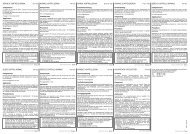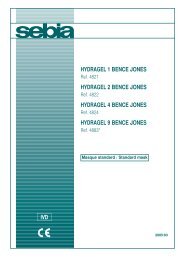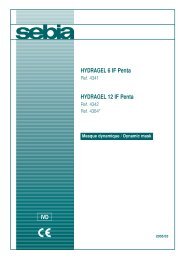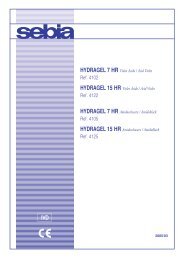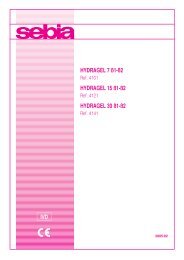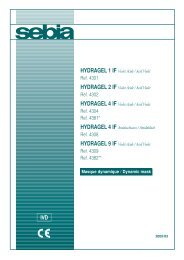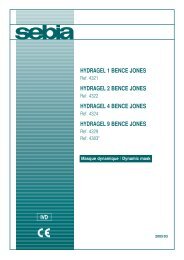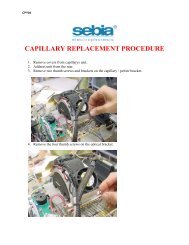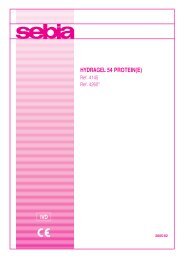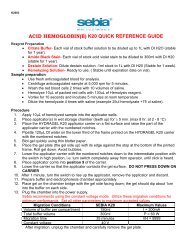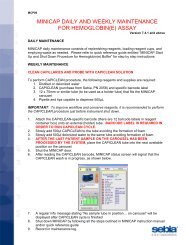Customer Focus
The 1000th MINICAP user - Sebia Electrophoresis
The 1000th MINICAP user - Sebia Electrophoresis
- No tags were found...
You also want an ePaper? Increase the reach of your titles
YUMPU automatically turns print PDFs into web optimized ePapers that Google loves.
BERGMANNSHEIL<br />
BOCHUM<br />
<strong>Customer</strong> <strong>Focus</strong><br />
BG-University Hospital Bergmannsheil<br />
Bochum, Germany<br />
GERMAN HOSPITAL RECEIVES SEBIA’S<br />
1000th MINICAP INSTRUMENT<br />
“For us, the MINICAP was the perfect choice.”<br />
BG-University Hospital Bergmannsheil in Bochum, Germany, has an<br />
operating philosophy of “Healing and help with all appropriate means."<br />
Accordingly, the hospital’s clinical laboratory has taken “all appropriate<br />
means” to soothe the pain points typically felt by labs: namely, how to<br />
control labor costs and maintain test quality as the workload continues to<br />
increase. The lab, one of the most advanced in Germany, has the ability to<br />
run 170 different blood tests quickly and efficiently – with minimal handling<br />
by staff.<br />
Bergmannsheil adopted automated capillary electrophoresis (CE) in<br />
2001 as an alternative to the very labor-intensive cellulose acetate method.<br />
At that time, the lab employed 29 technologists; the headcount now stands at 21, yet the lab’s test menu has broadened<br />
significantly in recent years.<br />
“Controlling labor costs is one of the key challenges for German labs,” notes<br />
Hugo Stiegler, MD, Medical Director of the Department of Clinical Chemistry,<br />
Immunology and Hematology at Bergmannsheil.<br />
Recently, Dr. Stiegler implemented the latest evolution in CE technology: the<br />
MINICAP instrument from Sebia. The MINICAP offers a compact, robust, fully<br />
automated platform that’s simple to operate and affordable for laboratories<br />
running small-to medium-sized test batches. “We typically average about 20-30<br />
electrophoresis screenings a day, doing as many as 40-50 on heavier days,” Dr.<br />
Stiegler explains.<br />
Bergmannsheil’s installation is the 1000th MINICAP to go live worldwide. The<br />
instrument is gaining popularity in many countries because it makes the latest CE<br />
automation available to labs that previously lacked the volumes to justify more expensive “hands-free” systems.<br />
MINICAP: fully automated capillary electrophoresis<br />
“The MINICAP is not only very<br />
fast and reliable but also<br />
somewhat more convenient<br />
and intuitive.”<br />
According to Dr. Stiegler, the MINICAP brought some important<br />
improvements to the lab. “The MINICAP is not only very fast and<br />
reliable but also somewhat more convenient and intuitive. Even a<br />
person who is not 100 percent familiar with this instrument can<br />
confidently run it.”<br />
Dr. Stiegler also likes the fact that the MINICAP<br />
quantifies the monoclonal bands, something not easily<br />
done on his previous system. “This allows us to monitor<br />
the percentage decrease of the bands, giving us a<br />
clearer picture of how the patient is progressing under<br />
therapy.”<br />
“Sebia has given us exactly<br />
what we need, at a price point<br />
that makes sense for a lab this<br />
size. It is the ideal solution.”<br />
400 - 1705 Corporate Drive • Norcross, Georgia 30093 • Telephone: (800) 835-6497 • Fax: (770) 446-8511• www.sebia-usa.com
<strong>Customer</strong> <strong>Focus</strong><br />
How the MINICAP works<br />
The MINICAP utilizes liquid flow electrophoresis with buffer serving as the medium in<br />
lieu of agarose gel. The technologist simply places a bar-coded sample tube on the<br />
system -- and walks away. The MINICAP yields a throughput of up to 20 serum protein<br />
samples per hour; STAT protein electrophoresis results can be obtained in less than<br />
10 minutes.<br />
Other unique features of the MINICAP allow Bergmannsheil to:<br />
• Store up to 100,000 CE result curves and data;<br />
• Simplify operator editing, thanks to automatic identification of fractions;<br />
• Import quantitative protein results into one comprehensive<br />
chartable report;<br />
• Add unlimited comments;<br />
• Access comprehensive quality control tools including<br />
Levey-Jennings charts; and<br />
“…Sebia consistently<br />
demonstrates their<br />
appreciation for our business.”<br />
• Network to other lab systems via modem connection.<br />
• It also provides for other testing such as urine Proteins, Immunotyping, Carbohydrate-deficient Transferrin (CDT)<br />
and Hemoglobinopathies.<br />
“This allows us to monitor the<br />
percentage decrease of the bands,<br />
giving us a clearer picture of how the<br />
patient is progressing under therapy.”<br />
“Sebia values us.”<br />
Sebia’s commitment to delivering top-notch quality<br />
and service made an impression on Dr. Stiegler.<br />
“Even though we are a low-volume lab compared to<br />
a lot of their clients, Sebia consistently demonstrates<br />
their appreciation for our business.”<br />
Sebia: Solving the challenges<br />
“Like other labs, we are constantly challenged to strike that balance between speed and cost -- without any compromise of<br />
quality,” says Dr. Stiegler. “Sebia has given us exactly what we need, at a price point that makes sense for a lab this size. It is<br />
the ideal solution.”<br />
ABOUT BG-UNIVERSITY HOSPITAL BERGMANNSHEIL<br />
Founded in 1890, as the first trauma center in the world built specifically to treat coal miners, BG-University Hospital<br />
Bergmannsheil today has 622 beds and 22 clinics and departments, serving 18,000 inpatients and 60,000 outpatients<br />
annually. As the academic hospital of Ruhr-University Bochum, the facility is renowned for science and research, and has a<br />
particularly strong reputation for treating spinal cord injuries and severe traumatic brain injuries and for surgical trauma<br />
medicine and plastic surgery.<br />
ABOUT SEBIA<br />
Founded in 1967, Sebia is a French based company head-quartered in Evry-Paris, France. The company develops, manufactures<br />
and commercializes protein electrophoresis tests and analyzers, dedicated to the in vitro diagnosis of cancer, inflammatory,<br />
metabolism and hemoglobin disorders. With a sales turnover of over 100M€, the<br />
company employs 400 persons. The products are sold worldwide, directly in 12<br />
countries and through a complementary network of distributors. Sebia’s focus on<br />
electrophoresis techniques allows a sustained R&D development program,<br />
providing innovation and automation to virtually any size laboratory. Both agarose<br />
gel electrophoresis and capillary electrophoresis assays, and their dedicated<br />
automation, are designed to be integrated into the same routine workflow. The two<br />
Sebia Corporate, Evry, France<br />
families of instruments, for gel (ASSIST and HYDRASYS 2 SCAN ) and for capillary<br />
electrophoresis (MINICAP, CAPILLARYS 2 - Flex Piercing and Neonat Fast models), are designed to work into the same lab<br />
network via the PHORESIS SQL based software, offering unlimited patients’ data storage.



